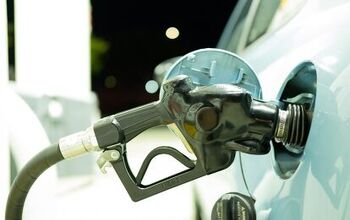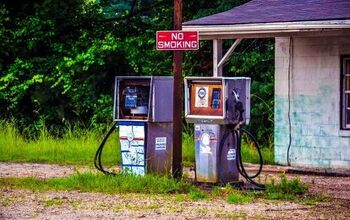America's Gas War Begins

Now that the Environmental Protection Agency has officially confirmed its intent to roll back Corporate Average Fuel Economy (CAFE) standards, the opposition has kicked things into high gear, mobilizing for the coming battle.
In one corner you have the White House and EPA Administrator Scott Pruitt seeking lowered emission mandates. They claim the Obama administration created unfeasible fueling regulations, noting that the public regularly opts for less-efficient trucks and SUVs and largely ignores the purchase of electric vehicles. In the other corner you have a handful of Senate Democrats, environmental groups, and a bunch of blue states led by California lawmakers. They all say the preexisting rules are not only feasible, but essential for the good of the nation.
If you’re wondering which side of the highly partisan issue is correct, we’d argue it has almost everything to do with your point of view. Both sides can make a fairly strong case, and will do just that as the battle heats up. Fortunately, this may not end up being a legitimate civil war — if the California Air Resources Board (CARB) is to be believed.
Initially, California said it would never consider CAFE rollbacks and would retain the strict fuel economy mandates solidified in 2011, regardless of what the federal government decided. However, as Pruitt’s announcement drew closer, it began to soften — saying there was room for compromise as long as California could keep its sovereignty. The EPA has not yet established a benchmark for the new rules and CARB chair Mary Nichols has said there is hope in that.
“Reason could prevail,” Nichols said at Bloomberg’s New Energy Finance’s Future of Energy Summit in New York. “There’s a way to get to success, unless your goal is to roll over California and not allow us to have any standards.”
Nichols said she’s willing to adjust California’s existing regulations to make them easier for automakers to comply with, but noted the state will refuse to abandon its overall emissions-reduction goals. However, most of the suggestions involve offering companies more pollution credits (for putting EVs on the road) or encouraging car-sharing models. Nichols also said automakers may not be held responsible for the pollution of power plants that provide energy to electric cars. But there’s been no mention of softening overall targets.
California Governor Jerry Brown is likely to back whatever the CARB comes up with, as they are frequently of one mind. Thus far, the state has only conducted informal talks with officials from the White House, EPA and NHTSA about the future of the fuel economy rules. But those discussions have not been entirely to California’s liking.
“They are not promising to do what we want,” Nichols said. “What they are saying is, ‘We’re going to propose a range of options, and we want you to like one of them.'”
Meanwhile, a half-dozen Senate Democrats have announced their complete opposition to any attempt to scale back fuel efficiency standards. The group criticized automakers for reneging on their earlier commitment to build cleaner cars after agreeing to the Obama-era rules. “And we will block any attempt to rescind California’s waiver. We will fight it if they try to put it in the budget, in any omnibus, or any other must-pass bill,” Sen. Edward Markey of Massachusetts explained to the press.
Markey is introducing the Gas Money Saved Act, which reaffirms the validity of the previously established fuel economy standards for vehicles of model years 2017 through 2021 and 2022 through 2025. The proposal suggests those targets would be advantageous for cash-strapped consumers and help drive innovation in the industry. Markey and his supporters also claim the act would be beneficial to America’s environmental health and national security — by minimizing the need for imported oil.
While a Republican-led Senate is unlikely to support the Gas Money Saved Act, the Democrats supporting the bill still see value in fighting for their cause and stopping what they see as hypocritical behavior on the part of the auto industry. Sen. Sheldon Whitehouse, a Democrat from Rhode Island and supporter of the proposed legislation, accused American automakers of “ hiding behind their trade association” to renege on standards they previously agreed to uphold.
“You can’t say on your website that you’re serious about clean energy, clean transportation and climate change, and then work through your trade association to undo a promise you made to the American people,” he said.

A staunch consumer advocate tracking industry trends and regulation. Before joining TTAC, Matt spent a decade working for marketing and research firms based in NYC. Clients included several of the world’s largest automakers, global tire brands, and aftermarket part suppliers. Dissatisfied with the corporate world and resentful of having to wear suits everyday, he pivoted to writing about cars. Since then, that man has become an ardent supporter of the right-to-repair movement, been interviewed on the auto industry by national radio broadcasts, driven more rental cars than anyone ever should, participated in amateur rallying events, and received the requisite minimum training as sanctioned by the SCCA. Handy with a wrench, Matt grew up surrounded by Detroit auto workers and managed to get a pizza delivery job before he was legally eligible. He later found himself driving box trucks through Manhattan, guaranteeing future sympathy for actual truckers. He continues to conduct research pertaining to the automotive sector as an independent contractor and has since moved back to his native Michigan, closer to where the cars are born. A contrarian, Matt claims to prefer understeer — stating that front and all-wheel drive vehicles cater best to his driving style.
More by Matt Posky
Latest Car Reviews
Read moreLatest Product Reviews
Read moreRecent Comments
- MaintenanceCosts E34 535i may be, for my money, the most desirable BMW ever built. (It's either it or the E34 M5.) Skeptical of these mods but they might be worth undoing.
- Arthur Dailey What a load of cow patties from fat cat politicians, swilling at the trough of their rich backers. Business is all for `free markets` when it benefits them. But are very quick to hold their hands out for government tax credits, tax breaks or government contracts. And business executives are unwilling to limit their power over their workers. Business executives are trained to `divide and conquer` by pitting workers against each other for raises or promotions. As for the fat cat politicians what about legislating a living wage, so workers don't have to worry about holding down multiple jobs or begging for raises? And what about actually criminally charging those who hire people who are not legally illegible to work? Remember that it is business interests who regularly lobby for greater immigration. If you are a good and fair employer, your workers will never feel the need to speak to a union. And if you are not a good employer, then hopefully 'you get the union that you deserve'.
- 28-Cars-Later Finally, something possibly maybe worth buying.
- EBFlex The simple fact is very small and cheap ICE vehicles have a range thats longer than all EVs. That is the bar that needs met. And EVs cannot meet that.Of course range matters. But that's one element of many that make EVs completely ineffective at replacing ICE vehicles.
- Wolfwagen I like the exterior mods short of the satellite dish. Put a normal interior in it and they could have sold it as some sci-fi movie trim


































Comments
Join the conversation
Automakers will make cars upto CAFE standards. Its too complicated to have Cali and non Cali equipped models. Plus rest of the world needs or atleast where American car companies sell needs more FE vehicles. Hence EV surge in China, massive tax subsidies in Scandinavia, No entry for non EV or PHEV in polluting mode in London central areas etc. Diesel numbers in EU provide what legislation can do. If you look at the American population and then look at the raw materials it consumes, that is not sustainable. I am hoping to avoid a 3 row crossover, a bit sad that I use an efficient 2 row crossover - my next car in 3-4 years has to be more FE with a lot of miles driven. Finally, Pruitt and Carson should be in jail. Carson's wife can then pick the furniture he gets in his cell.
It is odd that the folks who once supported Federal intervention in immigration by claiming enforcing laws was discriminatory during the past regime are also the very same people who want states to defy federal enforcement now that the political winds have shifted. And just as these very same people were shoving down our throats legislation for clean air on the arbitrary standards imposed in the 1970's are now telling us that we can't modify Federal standards but have to accept that state(s) overreach and specious environmental laws. I am a libertarian - I actually do believe in States rights to act on their own - whether by having their own mandates for healthcare insurance or in environmental laws, but I do not believe in Federal overreach - unless a power is clearly declared by the Constitution to be a FEDERAL POWER, the authority defaults to the states. It is this beautiful design that allows us 50 different petri dishes from which to sample solutions - be they healthcare insurance or environmental policies. However, since immigration is actually a Federal power because security of the borders is such a fundamental Federal Power for defense, we cannot have renegade states throwing up middle fingers to enforcing the federal laws. One can argue that pollution knows no boundary, but if we accept the premise that states can force the feds to go harsher, then why don't we force India and China to cut their far worse emissions? Obviously the cost benefit of having the worst offenders cutting to our current standards is far greater in impact than us whining about adopting a more stringent standard ourselves. And since CAFE is NOT a power granted to the Feds but seized by it under a most board interpretation of the "General Welfare" clause, we also should not have imposed such standards. The fleet standards imposed several years ago were intentionally harsh - since it was unlawful to ban purchasing trucks and SUV's, the next best way was to legislate the near impossibility of their sale by imposing arbitrary and impossible to reach mileage standards. And since the Feds think you can fiat technology once they pass harsher standards, we ended up with the malaise products of the 1970's which tried to meet standards with technology not there yet (computerization). I thus am more than happy if California wants to be punitive and wants cleaner air or higher mileage standards; but I loathe thinking that they want to impose their arbitrary and capricious standards on the rest of us.